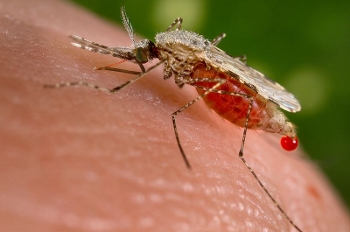NIMBioS Education Module
Using Linear Regression to Explore Environmental Factors Affecting Vector-borne Diseases

This activity was developed by an Incubator Group associated with the Quantitative Biology at Community Colleges Network meeting hosted by NIMBioS, February 27-29, 2020.
In this module students will use linear regression to analyze real data on vector-borne diseases and explore how environmental factors, such as climate change or population density, influence the transmission of these diseases. The activities are designed for face-to-face instruction and may be adapted for an online classroom.
Math Learning Objectives
- Perform data organization and analysis to produce descriptive statistics.
- Explain the relationship between two variables.
- Use technology to assist in the solution of both abstract and contextual problems.
Biology Learning Objectives
- Investigate the relationship between two variables using graphical and statistical methods (specifically linear regression).
- Assess limitations of the data set and data analysis methods.
- Discuss the human health and environmental implications based on the data.
Contents
- Instructor Guide (docx) (pdf)
- Opening Activity (docx) (pdf)
- Excel Instructions and Statistical Terms.docx" (docx) (pdf)
- Student Activities (docx) (pdf)
- Temp_Rainfall_Zika_Malaria Central America (xlsx)
- Solutions (docx) (pdf)
- Assessment (docx) (pdf)
Download Bundle Version 1.0 - published on 02 Sep 2020
Authors: Andy Adams¹, Jessica A Adams¹, John J. Bray¹, Tami Imbierowicz¹, Suzanne Lenhart², Breonna Martin¹
¹Harford Community College, ²University of Tennessee
Citation:
Adams A, Adams JA, Bray JJ, Imbierowicz T, Lenhart S, Martin B (2020). Using Linear Regression to Explore Environmental Factors Affecting Vector-borne Diseases. QB@CC Spring 2020 Incubator 5, QUBES Educational Resources. doi:10.25334/3Y6Y-4C52
Licensed under CC Attribution-ShareAlike 4.0 International according to these terms
Other NIMBioS education modules
For further information, please contact:
|
Suzanne Lenhart Associate Director for Education and Outreach Email: slenhart@tennessee.edu Ph: (865) 974-4270 (Math) (865) 974-9349 (NIMBioS) Fax: (865) 974-9300 | |
|
NIMBioS, 1122 Volunteer Blvd., Suite 106 University of Tennessee Knoxville, TN 37996-3410 | |
NIMBioS
1122 Volunteer Blvd., Suite 106
University of Tennessee
Knoxville,
TN 37996-3410
PH: (865) 974-9334
FAX: (865) 974-9461
Contact NIMBioS


